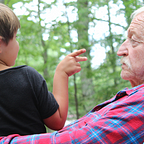1953: I turn fourteen
A Man Who Never Went to War
As my interest in girls returned and my depression waned, I found myself with a crush on a girl with beautiful light brown skin. Nita was not considered “negro.” Her mother was Portuguese, her father Spanish.
Her last name began with the letter “F,” and because there was no one in the class with a last name “G,” she was often assigned a seat close to me.
I can still recall her shape, her smell, her short skirts, her sway. Sitting behind her, or walking in the hall I would touch her back. Sometimes Nita would whisper, or pass me a note, “Invite me out.”
I thought of her every night.
If I mentioned her name at the dinner table, my mother would urge me not to think too much about her. Her skin was brown enough to frighten the mothers of boys like me — and, also, she was Catholic.
The summer between 8th and 9th grade confirmed that the stifling hand held me less firmly than before. Memories of that summer are less dark. I don’t recall killing frogs. I recall science experiments with a guy named Bailey.
We called him Beetle Bailey because he liked bugs and he looked like the skinny spectacled comic strip soldier. He led activities less manly than our traditional pursuits, including entomology and ukulele. We made exhibits of insects we’d caught, carefully pinning delicate limbs and wings to boards and labeling them in academic terms. My dad would bring cigar boxes from the store in town and we would paint them black and then create display cases for the beautiful butterflies and other bugs. I once caught a cecropia moth. Beetle Bailey taught us the scientific names.
And he sang. “Five foot two, eyes of blue.” He played a ukulele during rest period, or when it was raining and we spent more time in the bunkhouse. “In the evening by the moonlight,” he sang, “you can hear the darkies singing.” He taught me how to play.
I recall my mother appreciating him, too. But despite my delight in what Beetle brought to camp, that fall my dad asked me what I thought and I recommended that he not come back for another year of counseling. Less fit, less muscle, less husky, he didn’t fit the mold. It was a mold that had a hold of me. This was the fall, freshman year, that I was to go out for football.
When my father was in 9th grade he’d been captain of the varsity team. When I was in 9th grade, baby fat still hung over my belt. Laden down by oversized equipment, including an itchy jockstrap with with little substance to support, the school coach put me in to play in the first scrimmage. He didn’t do this because I was ready, but because he knew my dad was looking on from the sidelines. Numbers were spoken in the huddle. We lined up on the line, and after the ball was snapped I was pushed to the cold muddy turf. I got up, pretended to have an injured knee and limped to the sidelines.
Late the following afternoon, when my dad was home raking leaves in the back yard, I told him I’d quit football. I still remember where he stood — under the old pear tree in the back yard. As I write this that tree is still standing there, as is the ghost of my father.
Read more of A Man Who Never Went to War: 1954: I turn fifteen
